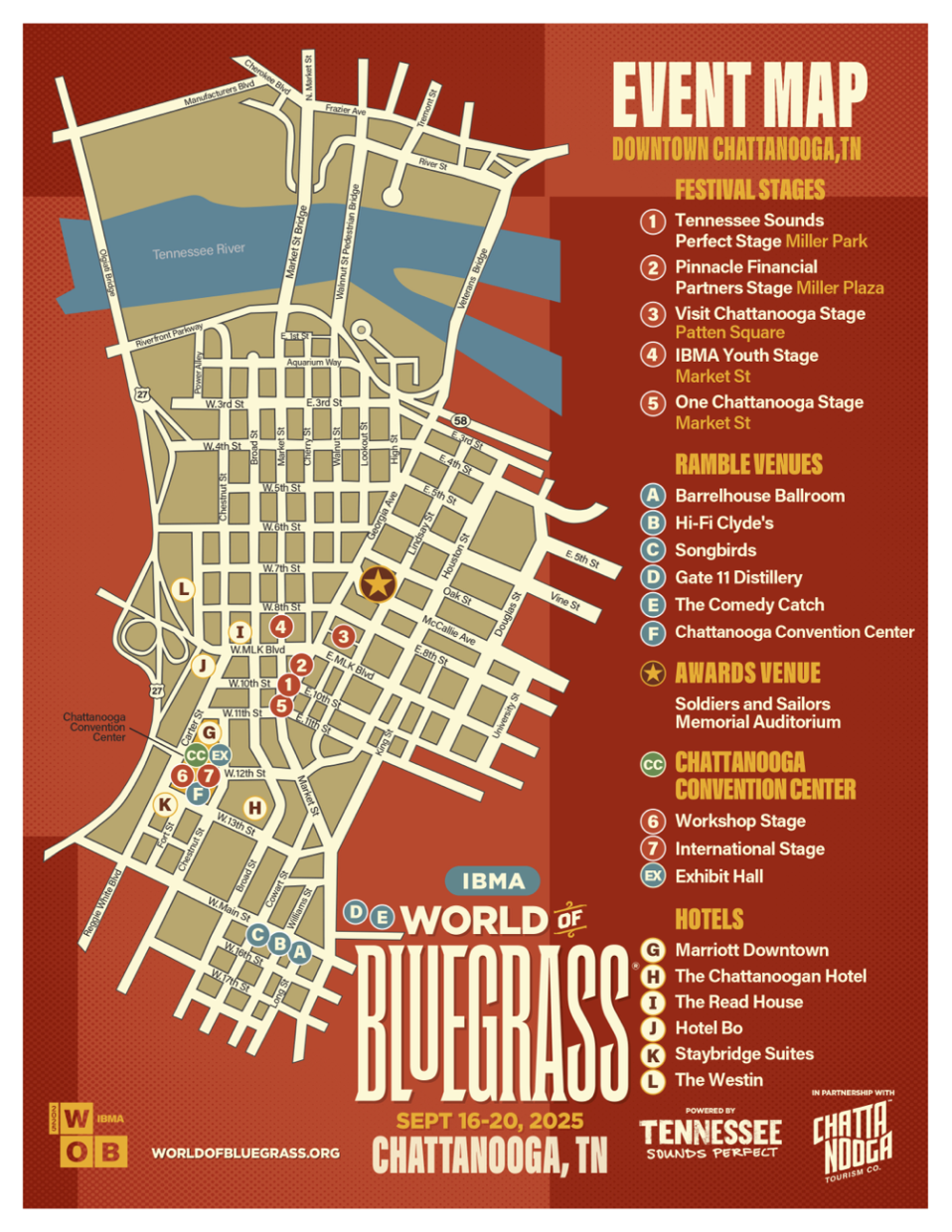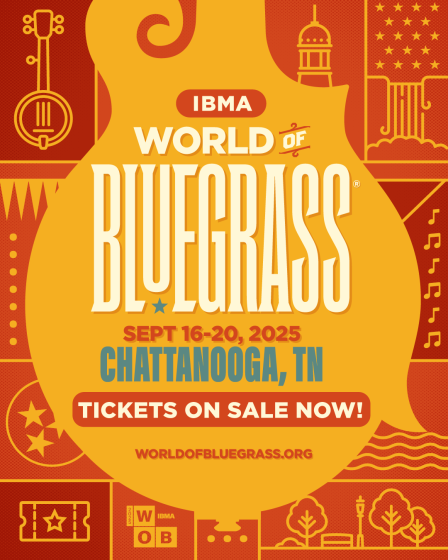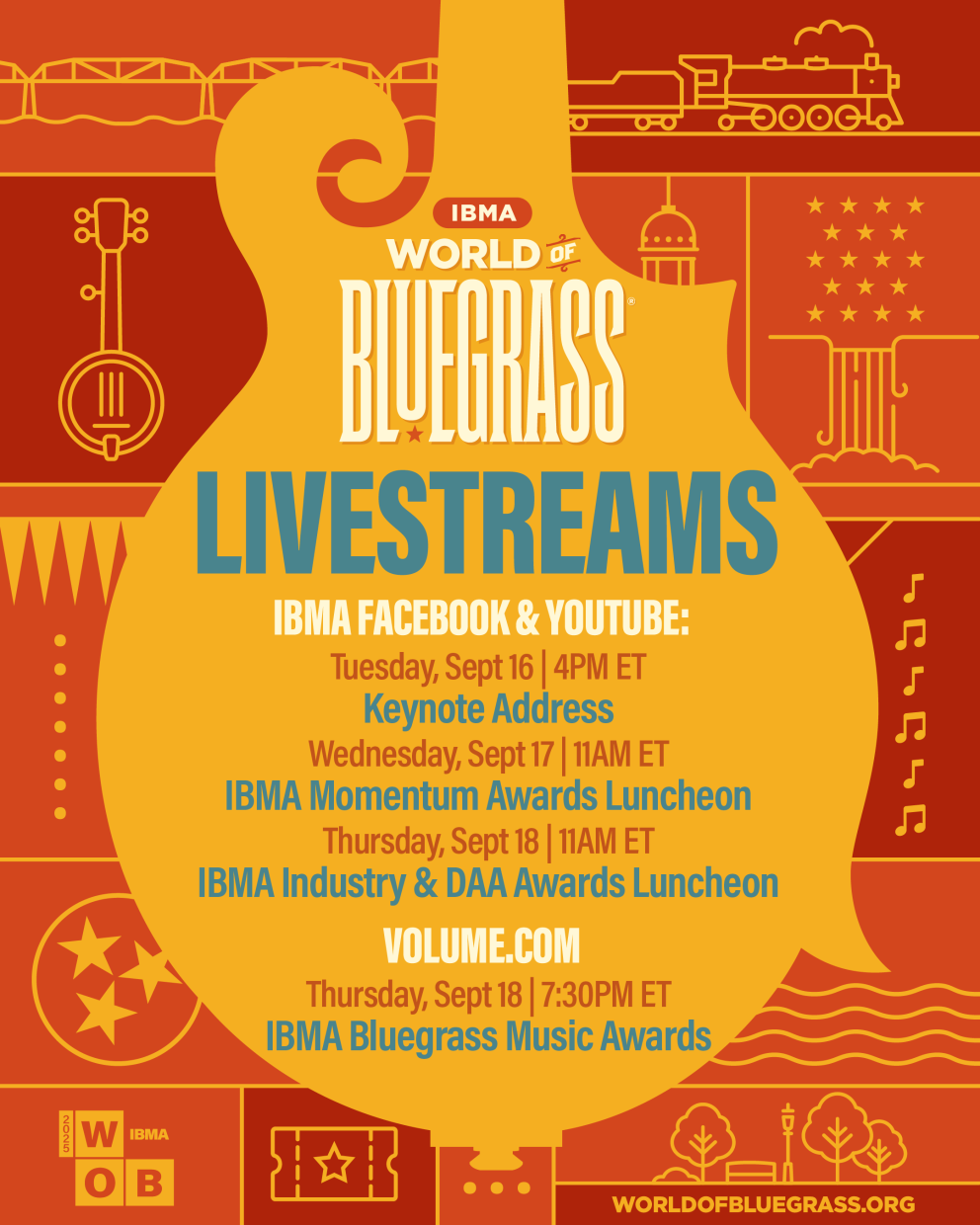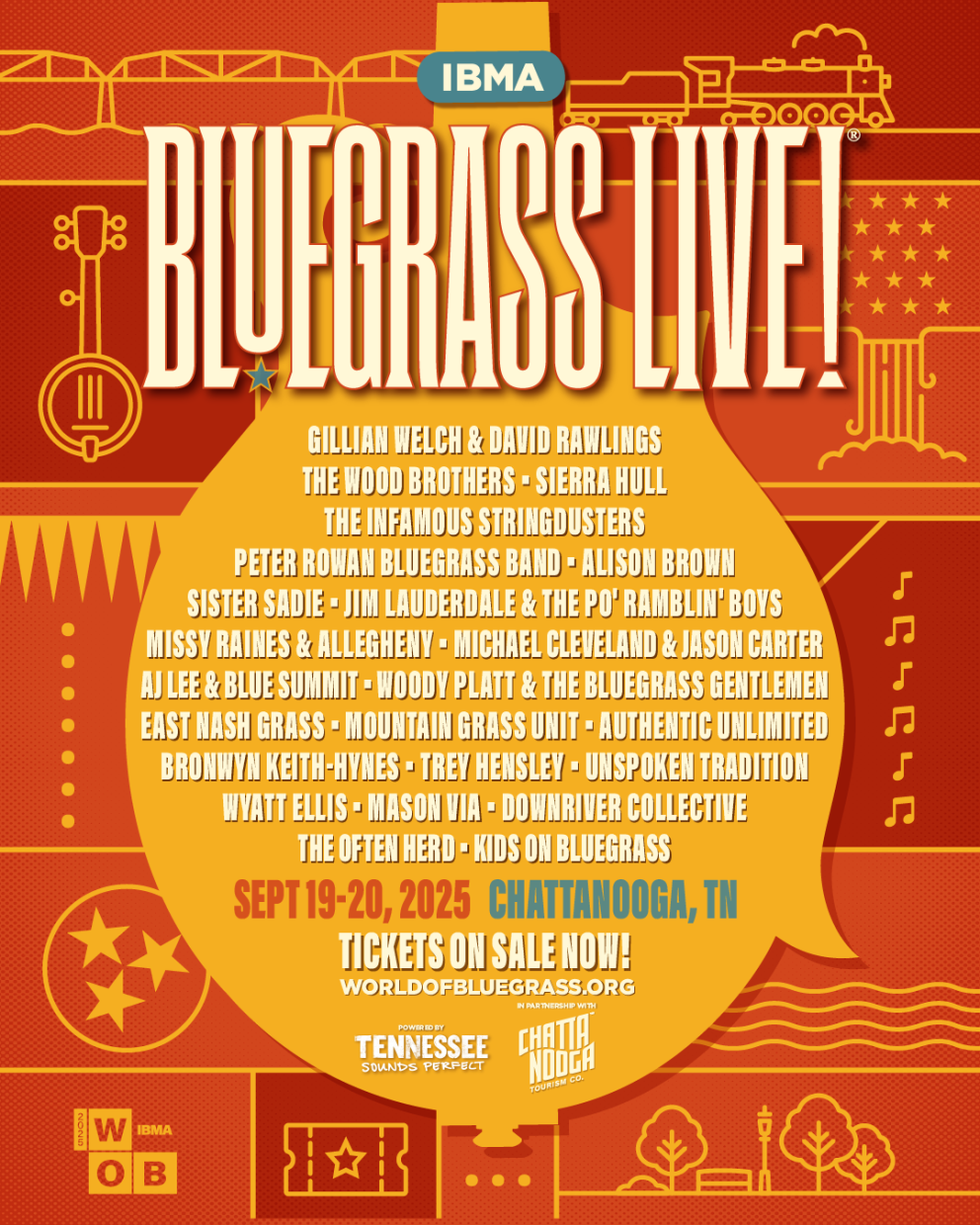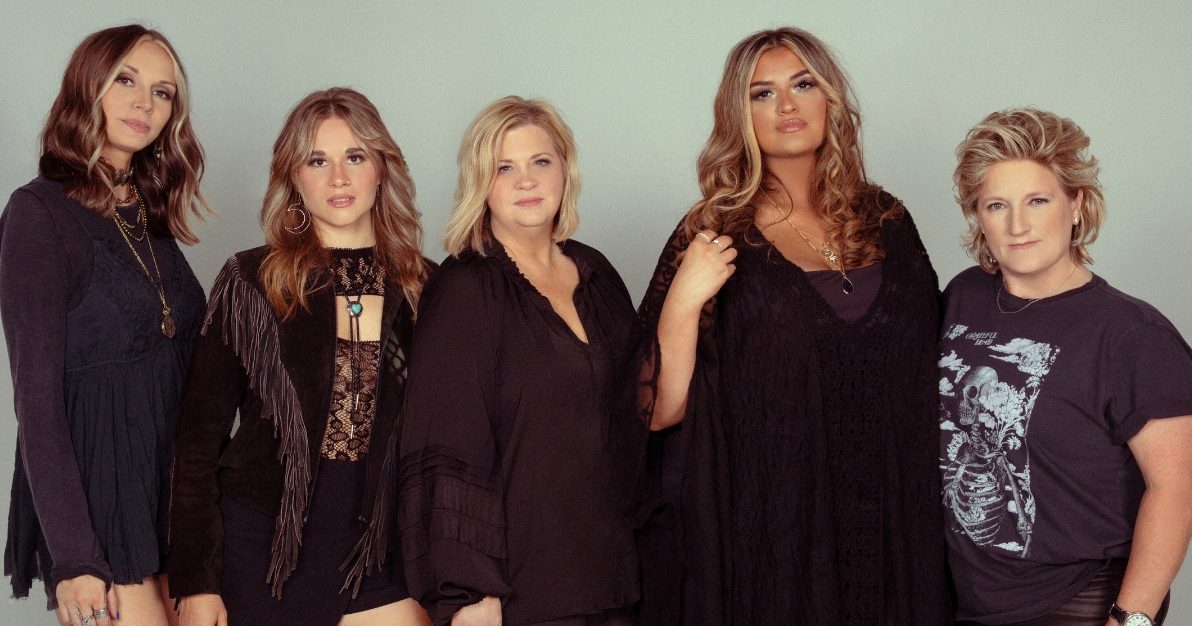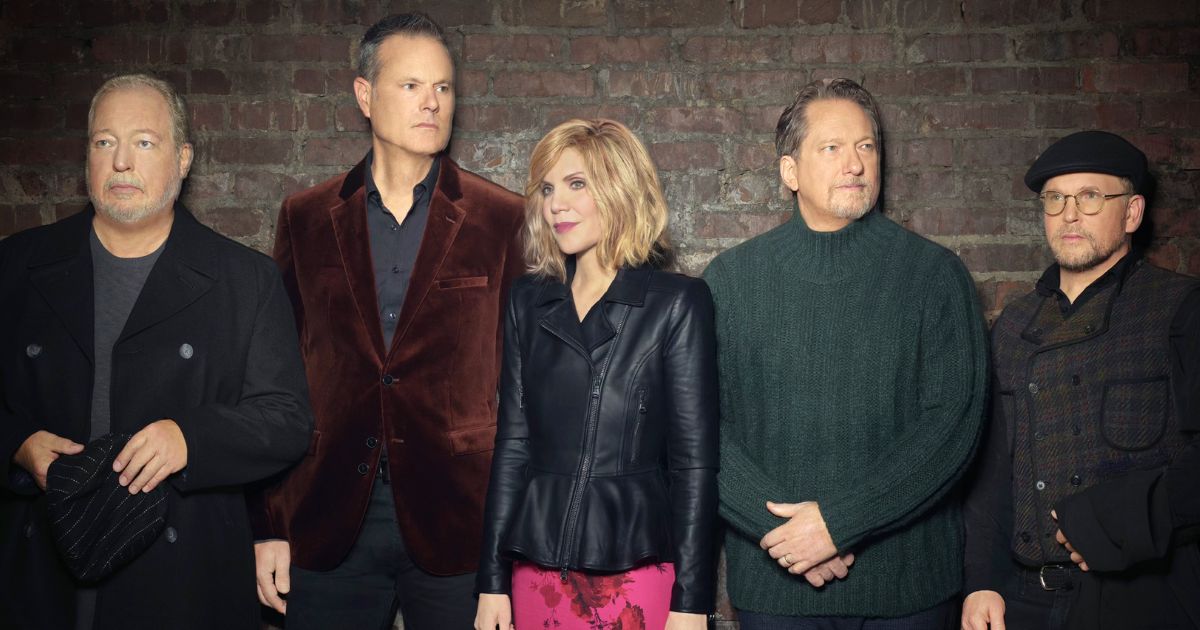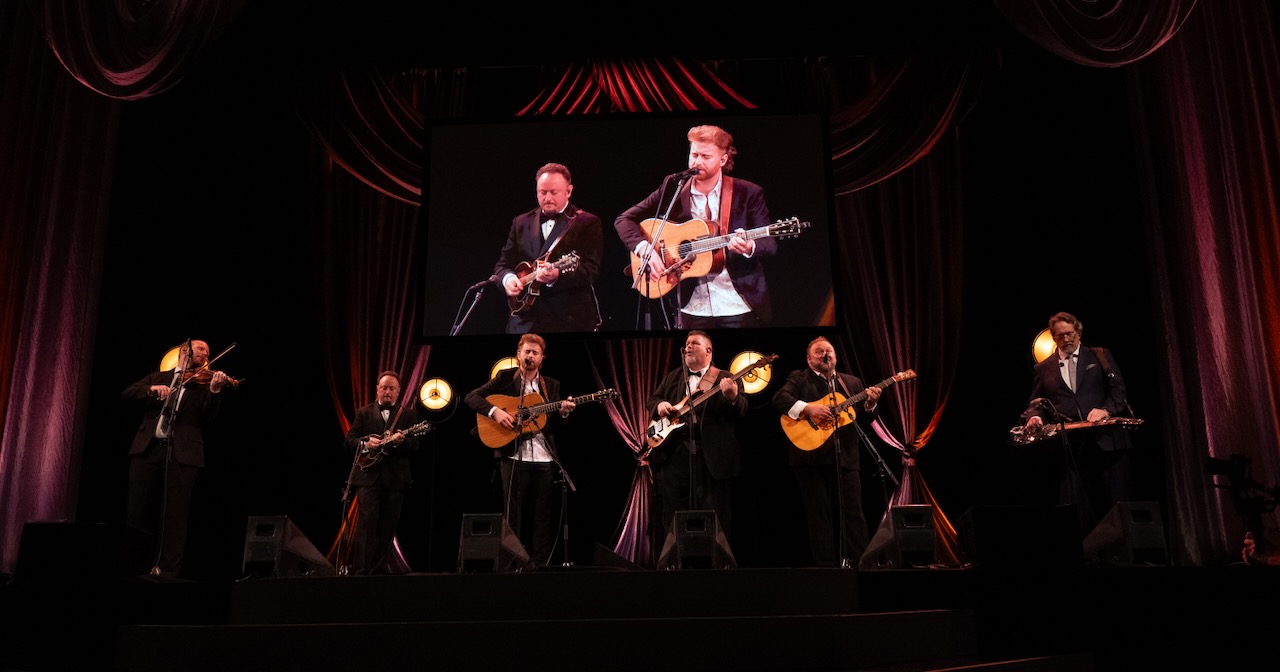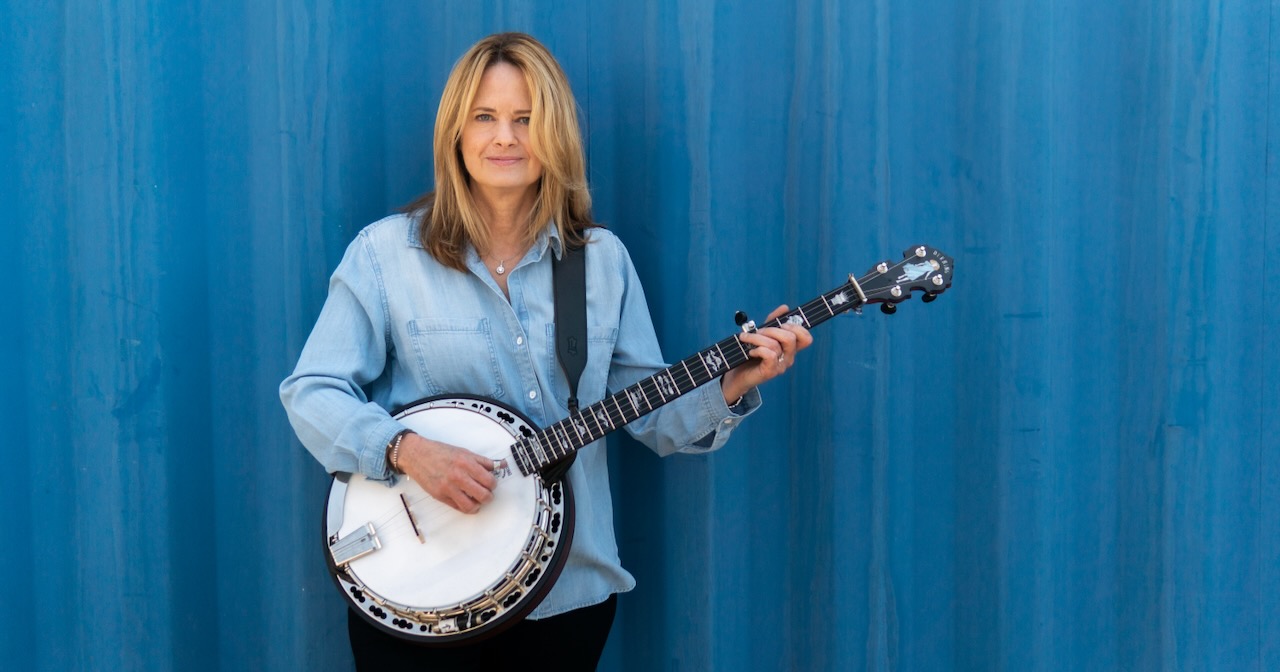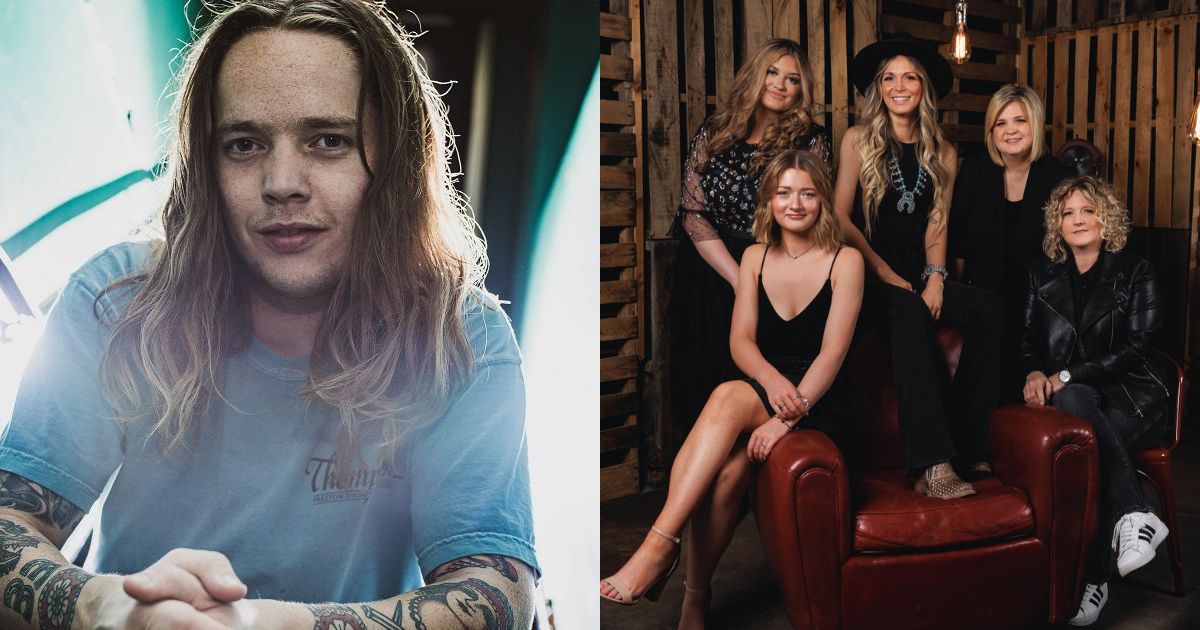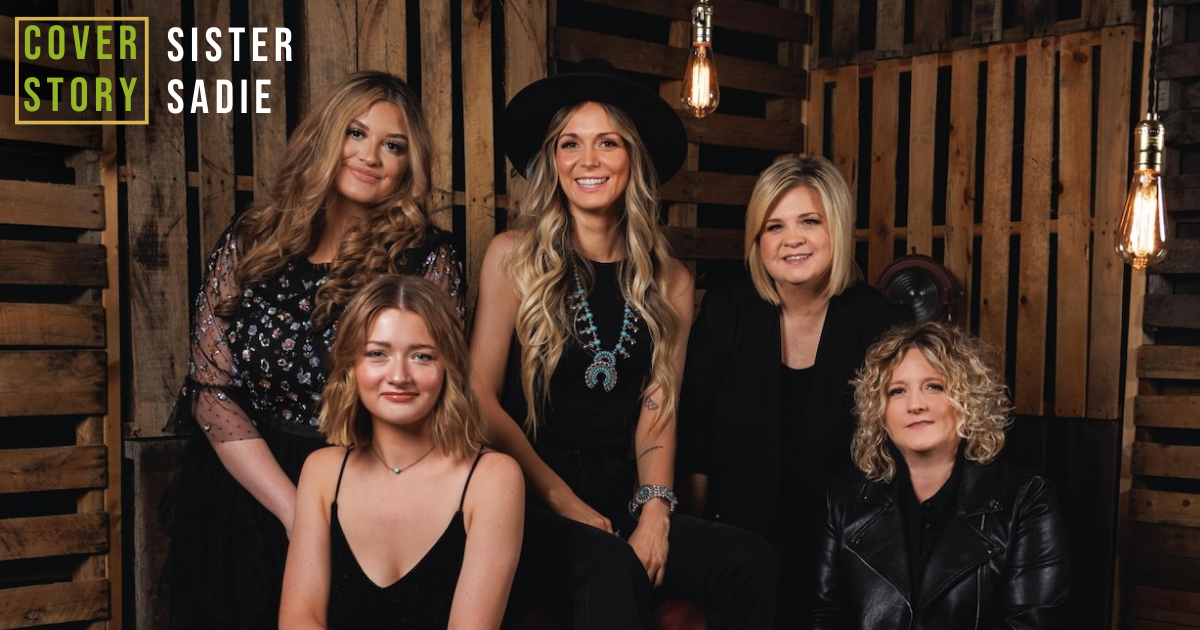Tonight, September 18, 2025, the International Bluegrass Music Association held their 36th Annual IBMA Bluegrass Music Awards at the Soldiers and Sailors Memorial Auditorium in Chattanooga, Tennessee – the organization’s first awards show presented in their new host city.
The IBMA Awards are designed to be peer-to-peer, voted on by the professional membership of the IBMA, performers, artists, industry professionals, broadcasters, and beyond. As a result, the show this year – which was hosted by the hilarious and talented duo of Steve Martin and Alison Brown – was an evening celebrating mutual admiration, mentorship, sharing, and the diverse ways all of this music’s creators celebrate tradition, and the innovation at its core. That phenomenon has been a hallmark of the IBMA Awards over all of their 36 years. Through the many categories there were a wide array of winners from across generations, styles, and levels of notoriety.
Bluegrass’s most prominent artist at the moment, Billy Strings, took home the night’s highest honor, Entertainer of the Year – his fourth such trophy. Alison Krauss, who recently returned to the road with a brand new album, Arcadia, for the first time in 14 years, received her fifth Female Vocalist of the Year award, her first since 1995. Jason Carter & Michael Cleveland received three awards for their superlative debut album together and its songs including Album of the Year, Song of the Year, and Collaborative Recording of the Year.
Women were represented in force across the many categories this year, remarkable given the sheer number of years where women nominees were absent entirely or merely counted in the single digits. Along with Krauss winning Female Vocalist women took home trophies in many more categories: Gospel Recording of the Year (Jaelee Roberts; writer, Kelsi Harrigill); Instrumental Recording of the Year (Kristin Scott Benson, Gena Britt, Alison Brown); Banjo Player of the Year (Kristin Scott Benson); Bass Player of the Year (Vickie Vaughn); Fiddle Player of the Year (Maddie Denton); and Mandolin Player of the Year (Sierra Hull).
During the IBMA Bluegrass Music Awards, the 2025 class of Bluegrass Music Hall of Fame inductees were honored with speeches, plaque presentations, and incredibly special musical performances. This year’s inductees include Hot Rize, The Bluegrass Cardinals, and Arnold Schultz, the first Black person to ever be elected to the hall, the association’s highest honor, since it was begun in 1991.
IBMA’s World of Bluegrass business conference and IBMA Bluegrass Live! festival continue in Chattanooga through Saturday, September 20. Get more information on the event and purchase tickets for Bluegrass Live! here. Below, check out all of the winners at this year’s 2025 IBMA Bluegrass Music Awards.
(Winners denoted in bold.)
ENTERTAINER OF THE YEAR
Alison Krauss & Union Station
Appalachian Road Show
Billy Strings
East Nash Grass
The Del McCoury Band
SONG OF THE YEAR
“5 Days Out, 2 Days Back” – Alison Brown, Steve Martin, Featuring Tim O’Brien
Songwriters: Steve Martin, Alison Brown
Producers: Alison Brown, Garry West
Label: Compass Records
“Big Wheels” – Authentic Unlimited
Songwriter: Jerry Cole
Producer: Authentic Unlimited
Label: Billy Blue Records
“Coal Dust Kisses” – The Grascals
Songwriters: Susanne Mumpower, Jerry Salley
Producer: The Grascals
Label: Mountain Home Music Company
“My Favorite Picture of You” – Darin & Brooke Aldridge
Songwriters: Darin Aldridge, Brooke Aldridge, Dennis Duff
Producers: Darin Aldridge, Mark Fain
Label: Billy Blue Records
“Outrun the Rain” – Jason Carter & Michael Cleveland
Songwriters: Terry Herd, Jimmy Yeary
Producers: Jason Carter, Michael Cleveland
Label: Fiddle Man Records
ALBUM OF THE YEAR
Arcadia – Alison Krauss & Union Station
Producer: Alison Krauss & Union Station
Label: Down the Road Records
Carter & Cleveland – Jason Carter & Michael Cleveland
Producers: Jason Carter, Michael Cleveland
Label: Fiddle Man Records
Earl Jam – Tony Trischka
Producers: Tony Trischka, Lawson White
Label: Down the Road Records
Highway Prayers – Billy Strings
Producers: Billy Strings, Jon Brion
Label: Reprise Records
I Built a World – Bronwyn Keith-Hynes
Producers: Brent Truitt, Bronwyn Keith-Hynes
Label: Sugar Petunia Records
VOCAL GROUP OF THE YEAR
Alison Krauss & Union Station
Authentic Unlimited
Blue Highway
Sister Sadie
The Del McCoury Band
INSTRUMENTAL GROUP OF THE YEAR
Billy Strings
East Nash Grass
Michael Cleveland & Flamekeeper
Molly Tuttle & Golden Highway
The Travelin’ McCourys
GOSPEL RECORDING OF THE YEAR
“Blue Collar Gospel” – Jerry Salley Featuring The Oak Ridge Boys
Songwriters: Rick Lang, Bill Whyte, Jerry Salley
Producer: Jerry Salley
Label: Billy Blue Records
“Dear Lord” – Darin & Brooke Aldridge
Songwriter: Daniel Davis
Producers: Darin Aldridge, Mark Fain
Label: Billy Blue Records
“Even Better When You Listen” – Joe Mullins & The Radio Ramblers
Songwriters: Rick Lang, Mark BonDurant
Producer: Joe Mullins & The Radio Ramblers
Label: Billy Blue Records
“He’s Gone” – Jaelee Roberts
Songwriter: Kelsi Harrigill
Producer: Byron House
Label: Mountain Home Music Company
“Wings of Love” – Authentic Unlimited
Songwriters: Jesse Brock, Stephen Burwell, Jerry Cole, Eli Johnston, John Meador
Producer: Authentic Unlimited
Label: Billy Blue Records
INSTRUMENTAL RECORDING OF THE YEAR
“Bluegrass in the Backwoods” – Jason Carter & Michael Cleveland
Songwriter: Kenny Baker
Producers: Jason Carter, Michael Cleveland
Label: Fiddle Man Records
“The Drifter” – Danny Roberts
Songwriter: Danny Roberts
Producers: Danny Roberts, Andrea Roberts
Label: Mountain Home Music Company
“A Drive at Dusk” – Authentic Unlimited
Songwriter: Jesse Brock
Producer: Authentic Unlimited
Label: Billy Blue Records
“Kern County Breakdown” – Jason Carter & Michael Cleveland
Songwriter: Buck Owens, Don Rich
Producers: Jason Carter, Michael Cleveland
Label: Fiddle Man Records
“Ralph’s Banjo Special” – Kristin Scott Benson, Gena Britt, Alison Brown
Songwriter: Ralph Stanley
Producer: Alison Brown
Label: Compass Records
NEW ARTIST OF THE YEAR
AJ Lee & Blue Summit
Bronwyn Keith-Hynes
Jason Carter
Red Camel Collective
Wyatt Ellis
COLLABORATIVE RECORDING OF THE YEAR
“5 Days Out, 2 Days Back” – Alison Brown & Steve Martin Featuring Tim O’Brien
Songwriters: Steve Martin, Alison Brown
Producer: Alison Brown, Garry West
Label: Compass Records
“A Million Memories (A Song for Byron)” – Darin & Brooke Aldridge Featuring Vince Gill
Songwriter: Vince Gill
Producers: Darin Aldridge, Mark Fain
Label: Billy Blue Records
“Cora Is Gone” – Bobby Osborne & C.J. Lewandowski Featuring Rob McCoury, Billy Strings
Songwriter: Mac Odell
Producer: C.J. Lewandowski
Label: Turnberry Records
“Outrun the Rain” – Jason Carter & Michael Cleveland, Jaelee Roberts, Vince Gill
Songwriters: Terry Herd, Jimmy Yeary
Producers: Jason Carter, Michael Cleveland
Label: Fiddle Man Records
“Ralph’s Banjo Special” – Kristin Scott Benson, Gena Britt, Alison Brown
Songwriter: Ralph Stanley
Producer: Alison Brown
Label: Compass Records
MALE VOCALIST OF THE YEAR
Billy Strings
Dan Tyminski
Del McCoury
Greg Blake
Russell Moore
FEMALE VOCALIST OF THE YEAR
AJ Lee
Alison Krauss
Brooke Aldridge
Jaelee Roberts
Sierra Hull
BANJO PLAYER OF THE YEAR
Alison Brown
Gena Britt
Kristin Scott Benson
Ron Block
Tony Trischka
BASS PLAYER OF THE YEAR
Barry Bales
Mike Bub
Missy Raines
Todd Phillips
Vickie Vaughn
FIDDLE PLAYER OF THE YEAR
Bronwyn Keith-Hynes
Jason Carter
Maddie Denton
Michael Cleveland
Stuart Duncan
RESOPHONIC GUITAR PLAYER OF THE YEAR
Andy Hall
Jerry Douglas
Justin Moses
Matt Leadbetter
Rob Ickes
GUITAR PLAYER OF THE YEAR
Billy Strings
Bryan Sutton
Cody Kilby
Molly Tuttle
Trey Hensley
MANDOLIN PLAYER OF THE YEAR
Alan Bibey
Jesse Brock
Ronnie McCoury
Sam Bush
Sierra Hull
MUSIC VIDEO OF THE YEAR
“5 Days Out, 2 Days Back” – Alison Brown & Steve Martin Featuring Tim O’Brien
Songwriters: Steve Martin, Alison Brown
Producer: Alison Brown, Garry West
Videographer: Joseph Spence
Label: Compass Records
“A Million Memories (A Song for Byron)” – Darin & Brooke Aldridge Featuring Vince Gill
Songwriter: Vince Gill
Producer: Jenny Gill
Videographer: Travis Flynn
Label: Billy Blue Records
“Big Wheels” – Authentic Unlimited
Songwriter: Jerry Cole
Producers: Bryce Free, Kyle Johnson
Videographer: Bryce Free
Label: Billy Blue Records
“Gallows Pole” – Appalachian Road Show
Songwriter: Traditional, arr. Barry Abernathy, Jim VanCleve, Darrell Webb
Producer: Steve Kinney
Videographer: Steve Kinney
Label: Billy Blue Records
“Tennessee Hound Dog” – The Grascals
Songwriter: Felice Bryant, Boudleaux Bryant
Producer: Ty Gilpin
Videographer: Nate Shuppert
Label: Mountain Home Music Company
“The Auctioneer” – The Kody Norris Show
Songwriters: Leroy Van Dyke, Buddy Black
Producer: James Gilley
Videographer: Nate Wiles
Label: Rebel Records
Photo Credit: Billy Strings by Dana Trippe; Jason Carter & Michael Cleveland by Emma McCoury.


